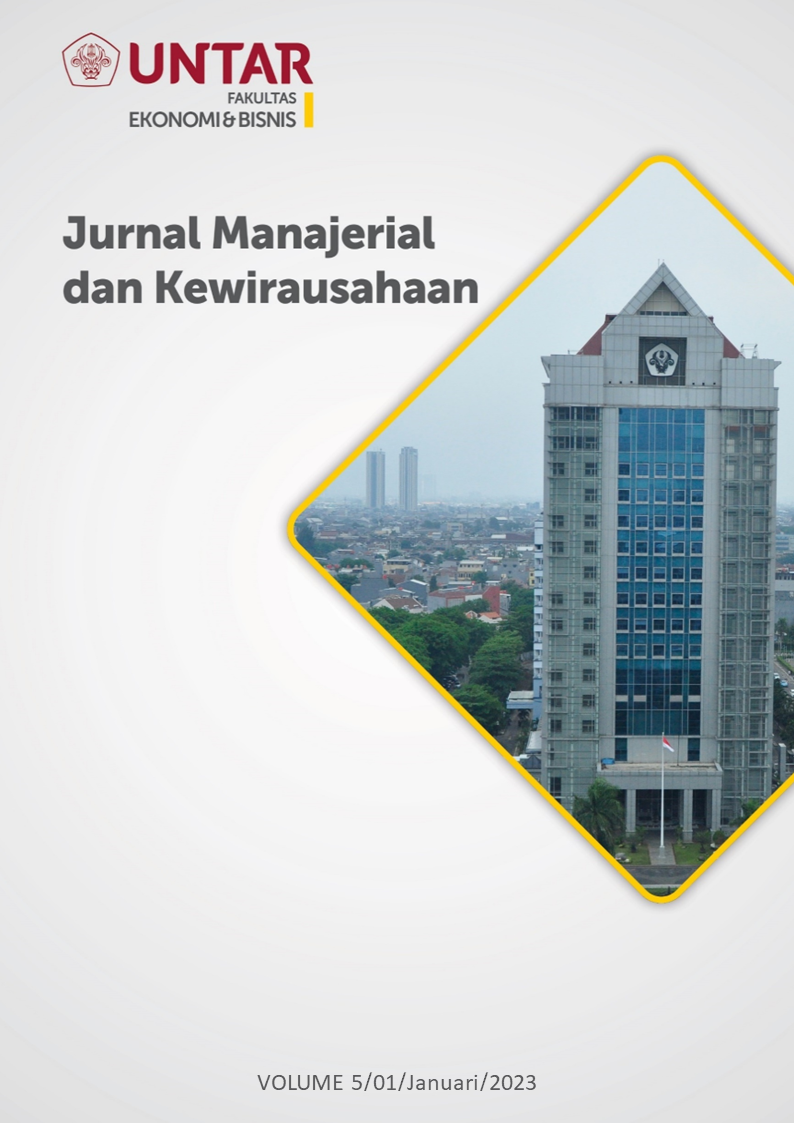Faktor-Faktor yang Mempengaruhi Minat Kewirausahaan Sosial pada Mahasiswa Universitas Tarumanagara
Main Article Content
Abstract
Penelitian ini bertujuan untuk menguji bagaimana variabel dukungan sosial (PCS), empati kepada sesama (ETO), dan efikasi diri (PSE) mempengaruhi minat kewirausahaan sosial (SEI). Sampel dalam penelitian ini adalah 86 mahasiswa di Universitas Tarumanagara. Teknik pengambilan sampel yang digunakan dalam penelitian ini adalah purposive sampling. Pengumpulan data dengan menggunakan kuesioner. Temuan menunjukan dukungan sosial, empati kepada sesama, dan efikasi diri mempengaruhi minat kewirausahaan sosial mahasiswa di Universitas Tarumanagara.
This study aims to examine how perceived community support (PCS), empathy towards other (ETO), and perceived self-efficacy (PSE) affect social entrepreneurial intention (SEI). The sample in this study were 86 students in Tarumanagara University. The sampling technique used is purposive sampling. Data collection technique used is questionnaire. The findings show that entrepreneurial self-efficacy and entrepreneurial creativity did affect student’s entrepreneurial intention in Tarumanagara University.
Article Details
Section

This work is licensed under a Creative Commons Attribution-NonCommercial-ShareAlike 4.0 International License.
This work is licensed under a Jurnal Muara Ilmu Ekonomi dan Bisnis Creative Commons Attribution-ShareAlike 4.0 International License.,/p>
References
Asmuruf, T. A. & Soelaiman, L. 2022, April. Entrepreneurship Intentions Among Vocational School Students in Sorong Regency-West Papua. In 3rd Tarumanagara International Conference on the Applications of Social Sciences and Humanities (TICASH 2021) (pp. 1301-1306). Atlantis Press. https://doi.org/10.2991/assehr.k.220404.208
Aure, P. A. P., Dui, R.P., Jimenez, S. V., Daradar, D. D., Gutierrez, A. N. A., Blasa, A. C., & Sy-Changco, J., 2019. Understanding social entrepreneurial intention through social cognitive career theory: a partial least squares structural equation modelling approach. Organizations and Markets in Emerging Economies, 10(1), pp.92-110.
Bargsted, M., Picon, M., Salazar, A., & Rojas, Y., 2013. Psychosocial characterization of social entrepreneurs: A comparative study. Journal of social entrepreneurship, 4(3), pp.331-346.
Hamid, Z., Hengchao, Z., & Mhd-Sarif, S., 2017. Economic theories of social entrepreneurship. International Journal of Accounting, Finance and Business (IJAFB), 2(6), pp.110-122.
Hockerts, K., 2017. Determinants of social entrepreneurial intentions. Entrepreneurship Theory and Practice, 41(1), pp.105-130.
Ip, C.Y., Wu, S.C., Liu, H.C., & Liang, C., 2017. Revisiting the antecedents of social entrepreneurial intentions in Hong Kong. International Journal of Educational Psychology, 6(3), pp.301-323.
Kannampuzha, M. & Hockerts, K., 2019. Organizational social entrepreneurship: scale development and validation. Social Enterprise Journal.
Kim, H. & Han, S., 2018. Does personal distress enhance empathic interaction or block it? Personality and Individual Differences, 124, pp.77-83.
Mohammadi, P., Kamarudin, S., & Omar, R., 2020. Do Islamic Values Impact Social Entrepreneurial Intention of University Students in Malaysia? An Empirical Investigation Into The Mediating Role of Empathy. International Journal of Economics & Management, 14(3).
Rambe, P. & Ndofirepi, T. M. 2021. Explaining social entrepreneurial intentions among college students in Zimbabwe. Journal of Social Entrepreneurship, 12(2), pp.175-196.
Saban, M. T. & Kirby, A., 2019. Empathy, social relationship and co-occurrence in young adults with DCD. Human movement science, 63, pp.62-72.
Sugiyono. (2019). Metode Penelitian Kuantitatif, Kualitatif, dan R&D. Bandung: Alfabeta.
Tiwari, P., Bhat, A. K., & Tikoria, J., 2017. The role of emotional intelligence and self-efficacy on social entrepreneurial attitudes and social entrepreneurial intentions. Journal of Social Entrepreneurship, 8(2), pp.165-185.
Weaver, R. L., 2018. Re-conceptualizing social value: applying the capability approach in social enterprise research. Journal of Social Entrepreneurship, 9(2), pp.79-93.
Wijaya, A., Ekadjaja, A., & Geovanny, C., 2021. Pengaruh Openness Dan Entrepreneurial Self-Efficacy Terhadap Entrepreneurial Intention Dimoderasi Entrepreneurship Education Dan Gender. Ultima Management: Jurnal Ilmu Manajemen, 13(1), pp.62-73. https://doi.org/10.31937/manajemen.v13i1.1942
Younis, A., Xiaobao, P., Nadeem, M. A., Kanwal, S., Pitafi, A. H., Qiong, G., & Yuzhen, D., 2021. Impact of positivity and empathy on social entrepreneurial intention: The moderating role of perceived social support. Journal of Public Affairs, 21(1), p.e2124.
Tingkat Pengangguran Terbuka di Asia Tenggara (2020-2022).

